Security to the secretary general is not a decree
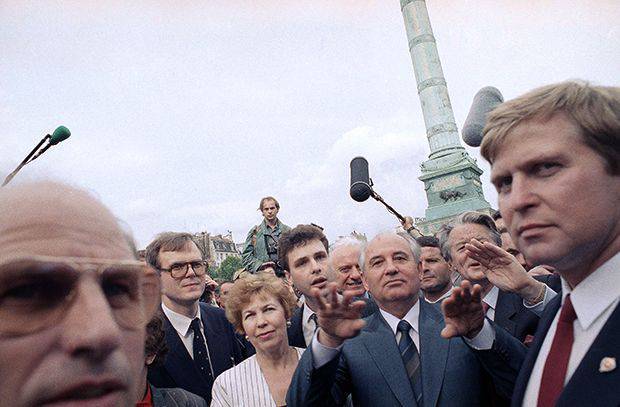
9-e KGB Management: 1985 – 1992
Studying stories The bodyguard in the USSR reveals a clear tendency: if those who were attached to the protected had good relations, then they remained loyal to him to the end, even after his death. And vice versa: arrogance, captiousness and ingratitude in communicating with bodyguard officers at a difficult time could leave the leader of a huge country alone with his problems and foes.
"I will come here in a year"
15 November 1982 of the year in the Column Hall of the House of Unions of the USSR held a ceremony on the last journey of Leonid Ilyich Brezhnev. On this day, a sign tradition was established for all those present in the main mourning hall of the country. The first of the "special zone" to the coffin of the late General Secretary of the CPSU Central Committee was his successor. This moment with the deepest trepidation was waited by all present without exception. Including the leaders of the leading powers of the world, who considered it necessary to personally come to the funeral of the head of the Soviet state.
The funeral of Yuri Vladimirovich Andropov passed 14 February 1984 year. George Bush (senior), then vice president of the United States, and British Prime Minister Margaret Thatcher arrived. Both of them were present in the Column Hall that day. The current president of NAST Russia, Dmitry Fonarev, at that event was responsible for meeting distinguished guests at the special entrance of the House of Unions and for accompanying them to the place of farewell in the Hall of Columns. According to him, Margaret Thatcher, seeing that the first out of the open door in the opposite corner of the hall appeared Konstantin Chernenko (head of the security team he had Victor Ladygin), said to his attendants: "I will come here again in a year."
And so it happened: Thatcher fulfilled her promise of 13 March 1985 of the year and this time saw that the first of the "sacred" room to Konstantin Chernenko’s coffin came out - it was out, and not appeared, like his predecessor, Mikhail Gorbachev (head of security - Nikolay Zemlyansky).
To give the reader an opportunity to better feel the scale of such mourning events, it suffices to tell how much work went on the 9-e Office of the KGB of the USSR in these sad four days for the country.
Thus, the leaders of 35 countries arrived at the funeral of Brezhnev at the invitation of the Central Committee of the CPSU. The number of delegations represented by other persons was up to 170. Each head of a foreign state must be provided with security from officers of the 18 division and the main GON vehicle. High-level delegations from socialist countries were provided with dwellings in state houses, the rest were accommodated in their embassies and representative offices.
In the same way, according to the protection plans drawn up for the funeral of Joseph Stalin, the rest of the mourning events also took place.
Personnel
By 1985, 9, the KGB Directorate of the USSR, was a superbly tuned system that fully complied with the requirements of the era. In general terms, its basic structure can be described as follows:
1 Division - Personal Guard:
18-e (backup) branch
security department of each protected person
2 Division - Counterintelligence (Internal Security)
4 department - engineering and construction
5-th department united three branches:
1-e branch - the protection of the Kremlin and Red Square
2-e compartment - protection of routes
3 Section - guarding the urban residences of protected persons
6 department - special kitchen
7-th department combined two branches:
1-e office - the protection of country cottages
2-e branch - the protection of public houses in the Lengor
8-th department - economic
The commandant of the Moscow Kremlin:
Commandant's Office of the Kremlin 14 Corps
Kremlin regiment
The commandant of the guard of buildings of the Central Committee of the CPSU on Old Square
Commandant's Office for the Security of the Council of Ministers Buildings
Special purpose garage
Human Resources Department
Department of Service and Combat Training (headquarters)
The personnel of 9-th Directorate consisted of a little more than 5000 people, including officers, officers (ensigns) and civilian employees. Candidates for the posts of management officers underwent a standard semi-annual personnel review by the KGB of the USSR and then the “course of the young fighter” at the Kupavna special training center. According to the established procedure, officers were allowed to work in the 1 department, with a few exceptions, who had approximately worked in the department for at least three years. Attached - the head of the security teams, as a rule, were appointed from officers of the 18 branch with a minimum experience of ten years.
The first department was headed by a participant in the Great Patriotic War, Major General Nikolai Pavlovich Rogov, whom the officers called with love and respect the White General, for his noble gray hair. Nikolai Rogov was replaced by the legendary Mikhail Vladimirovich Titkov, who passed his entire professional career from ensign to general in the “nine”.
In fact, the 9-e Office of the KGB of the USSR by the middle of 1980-x was a powerful and highly centralized system, the head of which had direct access to the head of state. At the same time, his "possession" was all the power of the KGB and the Ministry of Internal Affairs of the USSR. As for the army, the Minister of Defense was ex officio member of the Politburo of the Central Committee of the CPSU and, therefore, was also guarded by officers of the 9 Office of the USSR KGB. At the same time, the officers attached to the USSR Minister of Defense worked in the majors' uniforms - this corresponded to their ranks in the KGB, and one can imagine how many funny situations arose in their work when they indicated their due place to multi-star army generals ...
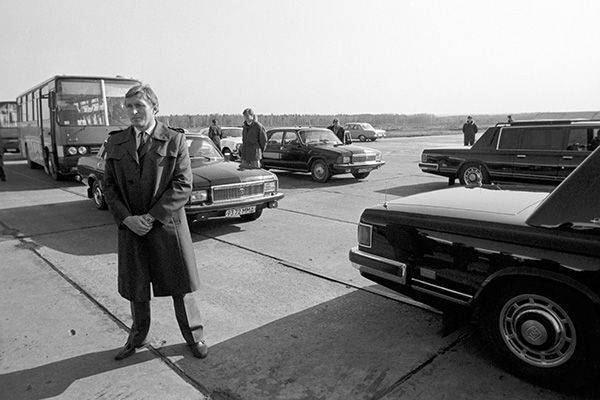
14 Division of the 1 Division of the 9 Division of the KGB of the USSR
From the day of the death of Konstantin Ustinovich Chernenko, the leadership of the Nine began literally an emergency job of recruiting personnel for the security group of the newly appointed General Secretary of the Central Committee of the CPSU, Mikhail Gorbachev. The traditional forge of personnel for the entire 1 division was its 18 branch, which at that time was headed by Vladimir Timofeevich Medvedev.
It was necessary to find a person who, in accordance with his professional experience, would be able to lead the main group of guards and, at the same time, both the age and human qualities would suit the Gorbachev couple. It is a couple, not a spouse. Yury Sergeevich Plekhanov, the head of the Nines, understood this perfectly well. The candidacy of Vladimir Timofeevich fit perfectly well. It remained to determine the quantity and quality of officers for the field guard of the General Secretary of the CPSU Central Committee. This work was entrusted to the management of the 1 department and the personnel department of the "nine".
Since the new Soviet leader, unlike the previous ones, was a man of active age, dynamic, the requirements for the personnel of the field guard, who had already received his separate 14 number, changed. These requirements were not formed by the guarded ones themselves, as is commonly thought in wide circles, namely, the head of the 9 Office, Yury Plekhanov, and the head of the security team, Vladimir Medvedev.
The backbone of Mikhail Sergeyevich Gorbachev’s exit guards was officers who already had experience working with top officials of the state. They were supplemented by young officers of the 18 division with sports qualifications (primarily in hand-to-hand combat), who underwent not only rigorous personnel tests, but also possessed the necessary intellectual and external data.
The full composition of the security group of the Secretary General of the Central Committee of the CPSU for the period from 1985 to 1992:
Medvedev Vladimir Timofeevich, head of department, senior officer-attached;
Boris Golentsov, officer-attached;
Hot Eugene, officer-attached;
Zemlyansky Nikolay, officer-attached;
Klimov Oleg, officer-attached;
Lifanichev Yury Nikolayevich, officer-attached;
Osipov Alexander, officer-attached;
Pestov Valery Borisovich, officer-attached;
Semkin Vyacheslav, commandant of the security group;
Belikov Andrey;
Vladimir Voronin;
Golev Alexander;
Golubkov-Yagodkin Evgeny;
Goman Sergey;
Grigoriev Evgeny;
Mikhail Grigoriev;
Zubkov Michael;
Ivanov Vladimir;
Klepikov Alexander;
Makarov Yuri;
Malin Nikolay;
Reshetov Evgeny;
Samoilov Valery;
Nikolai Tektov;
Feduleyev Vyacheslav.
The security chief and guarded were already familiar. In the summer of 1984, Medvedev was assigned to accompany Gorbachev’s spouse Raisa Maksimovna on a trip to Bulgaria. At the same time, he was rather transparently hinted that the assignment could greatly influence his further fate. The KGB already knew that young and promising Mikhail Gorbachev would come to replace the aged Konstantin Chernenko. The question was only in time. Vladimir Medvedev passed his “exam” in Bulgaria successfully.
At first, Vladimir Timofeevich was very pleased with the new service. Working with the energetic and young Gorbachev seemed much more interesting than with the sick Brezhnev. And Raisa Maksimovna initially made a good impression on him. But the joy was short-lived.
The first Soviet lady
In his book, The Man Behind the Back, Vladimir Medvedev noted that while working for Brezhnev and sometimes performing functions not characteristic of the security chief, he still never “felt like a servant” and was convinced that “the bodyguard is in many ways a family profession” . Under the Gorbachev couple, he had to face “arrogant estrangement, secrecy and sudden bursts of His sharpness” and “Her grandmother whims and whims”.
As the oldest state security officer, retired colonel Viktor Kuzovlev told us, it was not easy for Yury Plekhanov: “For all, even trifling questions, Raisa Maksimovna took it as a rule to call Plekhanov, the head of 9. She constantly demanded his heightened attention, regardless of his position. All this hurt him. He repeatedly asked to be transferred to another part of the work, but Gorbachev refused, stating that he trusted him completely and wanted him to be the security officer of his family and the families of all other leaders. ”
In the entire history of the Soviet state it was not accepted that the wives of the leaders interfere in public affairs. In the Gorbachev family, this tradition of continuation has not gained.
According to Vladimir Medvedev, one of the unusual and unpleasant duties that were assigned to him under Gorbachev was the recruitment of service personnel. Unpleasant - because the security chief was constantly involved in the conflicts of the first lady of the USSR with cooks, maids, state dacha employees and other service personnel.
As Vladimir Timofeevich noted, Raisa Maksimovna believed that good workers have no right to be ill. Attempts by the security chief to object that they are living people and different things can happen, she replied: “Don't, Vladimir Timofeevich, I am not interested in your opinion.” Once, at a holiday home in the Crimea, he released two women workers behind school notebooks for children: they had to return to Moscow on September 1, and they simply did not have another opportunity to prepare children for school. Upon learning of this, Raisa Maksimovna arranged for separation to all the service personnel, she also complained to her husband, who had reprimanded her security chief.
Vyacheslav Mikhailovich Semkin, the commandant of the security group, who traditionally worked with the protected person’s spouse and practically performed the functions of an attached Raisa Gorbacheva, recalled the following episode:
“In 1988, Gorbachev went on a visit to Austria. The guards were instructed to check the house where Mikhail Sergeyevich and his wife will live. I went out onto the balcony and saw that literally all the windows of the neighboring house were lined with cameras. What to do - to call somewhere? No, we decide everything ourselves, and on the spot. I ordered the windows to be laid in order to prevent them from taking pictures in the house. The windows were laid, the entrance to the balcony was hung with drapes. Raisa Maksimovna arrived, I began to show the house, and she wanted to go out to the balcony. And then I said: there, they say, it is impossible. Well, in response, of course, I heard: “Who can not ?! I can everywhere.
Vyacheslav Semkin this conversation almost cost the position ...
However, it cannot be said that the relationship between the Gorbachev couple and their security guards was unambiguously bad. The same Vladimir Medvedev recalled that in some matters both Raisa Maksimovna and Mikhail Sergeevich were very attentive: for example, they never forgot to congratulate him and his wife on birthdays. And with those security officers who "learned" to work with them, the Gorbachev spouses kept a distance, kept exactly.
Of course, Vladimir Timofeevich and Yuri Sergeyevich got the most of it. But this is a natural situation, as any questions of ensuring safety, comfort, rest, treatment, and other spheres of personal life were the responsibility of the management of the security team and, of course, the 9 Office.
According to the officers of the Nines, the main problem was that the main guarded country did not consider it necessary to take into account the real circumstances of everything that is happening around and even more so to carry out reasonable and sometimes essential for him recommendations of the security group. This was especially true of foreign trips, in terms of the number of which Mikhail Sergeyevich became the absolute record holder among the Soviet leaders.
He was in power for only six years - at first only as a party leader, and in March 1990 of the year he also took the position of President of the USSR for himself and for the country, for which he was elected the 3rd Extraordinary Congress of People's Deputies. During this short time, Mikhail Gorbachev managed to make several dozen visits to 26 countries of the world. In total, he spent almost half a year on business trips abroad.
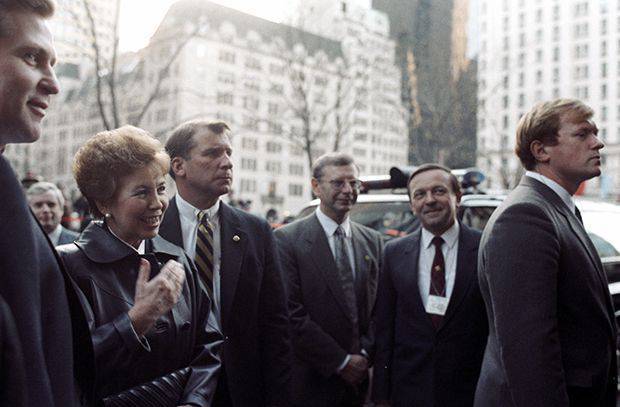
Frivolous games
According to the memoirs of Vladimir Medvedev, Gorbachev’s trips abroad were preceded by tremendous preparatory work. First, a group from the protocol departments of the presidential staff and the Foreign Ministry went to the place of the intended visit. Then, two or three weeks before the departure, another group flew, including security guards who prepared the stay. An hour and a half before the main departure another aircraft was sent - with meals, escorted by persons, and another guard. A separate plane delivered the main machine of Gorbachev and the cover machine.
Just like Nikita Khrushchev in his time, Mikhail Sergeyevich loved to communicate with the people. This is not surprising: he needed to show his democratic aspirations to the whole world. This was not something out of the ordinary: the leaders of Western countries did the same.
However, the same Americans were instituted: if the first person is going to "go to the people", it should notify security officers in advance that during the trip there will be events involving a large number of people. Thanks to this, the guards were able to work out a thoroughly thought-out route, clearly plan all meetings “with the people” - where, how much, for how long, etc.
“And our president got out of the car where his wife wanted,” recalled Vladimir Medvedev. - It was impossible to inspire him that it doesn’t seem like anything: “Is this what the guard will teach the secretary general?” Do not happen to this, not to happen! "As a result, the situation turned out ugly, there was a crush, emergency situations, people got bruises and bruises."
According to Medvedev, Mikhail Sergeyevich said: “I do my job, and you do yours. This is a good school for you. ”
Because of this attitude of Gorbachev to security issues, difficult situations constantly arose, and some of his impromptu with “exits to the people” could have ended very badly. If in the USSR this peculiarity was also calculated in case of such “surprises”, the reserve’s outfit was always strengthened both in the number of officers and in the time of entry into posts, then Mikhail Sergeyevich didn’t meet with foreign colleagues such decisions abroad. First of all, they were unpleasantly surprised by the agents of the American Secret Service.
“During his visit to the United States,” writes Vladimir Medvedev, “an American security guard was covering one of Gorbachev’s streets. He just hung over him, covering him with his body. People were drawn to the Soviet leader from all sides and received in response sharp blows to their hands. The guard literally unfolded our president and began to push him to the car. When we returned to the residence, he showed me that he was all wet and, through an interpreter, said: "These are very frivolous games."
Back in 1985, during a visit to France, unexpectedly for the security services, the Gorbachev couple decided to get out of the car in Bastille Square. The audience that met them there was not at all like a beau monde. On the contrary, it was "the top of the Parisian bottom": clochards, homeless, unemployed, drug addicts ... When they saw a richly dressed man and woman who had come out of a posh limousine, all this fraternity rushed forward hoping to make money. The stampede began, Gorbachev's bodyguard did not have the opportunity in the crowd for any quick action. As luck would have it, TV reporters were on the square at that moment, immediately starting to shoot this whole mess. Somehow, the security officers managed to fit the limousine and take Gorbachev away from the square. But this did not help either: literally after some hundred meters, he ... again ordered to stop with the words: “I made a move, deceived the correspondents”. The crowd rushed again to him, and the security again had a hard time ...
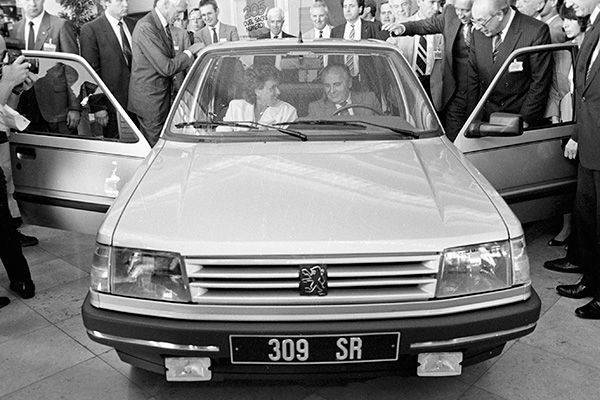
Pretty tickled the nerves of the guard and the incident that occurred during Gorbachev’s visit to Japan in April 1991. Since one of the topics of the talks was the Kuril Islands, public opinion was extremely agitated. In such an environment security measures needed to be strengthened.
Before the trip, the Japanese ambassador to the USSR sent two officers of the Japanese security service to Medvedev. They demanded that Gorbachev’s guard persuade him not to get out of the car where it was not provided for by the program. Hearing that the guards of the Soviet leader could not influence him, the Japanese were terribly surprised: how can a chief be capricious when it comes to his own safety ?! They insisted that Soviet colleagues go and report on the demand of the Japanese side to Gorbachev.
“Of course, we didn’t go anywhere,” recalls Vladimir Medvedev, “and even then we didn’t transfer this conversation to Gorbachev: it’s no use. The Japanese became very nervous ... Then everything went according to the usual disorder. Driving through the streets of the Japanese capital, Raisa Maksimovna suggested getting out of the car. ”
Passers-by immediately rushed to the presidential couple and surrounded her. Japanese youth chanted hostile slogans, demanding the return of the Kuril Islands. The setting was very hot. With great difficulty, the guard of the Soviet leader managed to form a corridor so that Mikhail Sergeevich and his wife could move along the street.
The head of the USSR and his wife were not injured, but the Japanese ambassador who accompanied the Soviet delegation was extremely annoyed. In fact, as Vladimir Medvedev noted, the situation turned out to be ugly, but “from a security point of view, it’s just ugly.” It is not surprising that they tried not to write about this case in newspapers - neither in Soviet nor in Japanese.
In fact, the situation was complicated by the fact that the officers of the field guard of the head of our country were ... without weapons - under Japanese law, it was subject to deposit at the border. Attached, however, had a weapon. It was a merit of the leadership of the N-9, which, in preparing the visit and negotiations with Japanese colleagues, argued that the Japanese allowed the US Secret Service agents to be in their country with weapons. A compromise on this issue was found. Only the last argument of the Chekists remained secret. What happens if the Japanese do not agree? Will there be a visit or not? This is not the Foreign Ministry protocol, it’s a security issue. And this is just a small touch to the topic of professionalism of the system, which was called “nine”.
How the KGB guarded Reagan
Continuing the theme of professionalism of the “Nines”, it is necessary to return to the 1987 year, since the real case of preventing a terrorist act against US President Ronald Reagan cannot be overlooked. This work was coordinated by Valery N. Velichko, Assistant Head of the 9 Directorate of the USSR KGB. Valery Nikolayevich came to the post in February 1986 at the invitation of Yury Plekhanov. According to the profile of official duties, he headed numerous management headquarters, created for each status event. And since such events were more than enough, the headquarters of the Nines worked almost constantly. Valery Nikolayevich headed such a headquarters during the visit of the American President in May 1998.
“... Literally a day before Reagan’s arrival, intelligence information was being transmitted to us about the impending assassination,” Valery Velichko said. - And the information was very scarce. It was known only the growth of the alleged terrorist - 190 centimeters and the fact that he, as part of the press team of the White House, flies for 40 minutes before the start of all events. So we had no time. It was then that a special group was allocated under my leadership, which was to prevent this terrorist act. We had every imaginable and inconceivable authority. ”
One episode of the work to ensure the security of this visit is recalled by Dmitry Fonarev, who then led a specially created antiterrorist group of the Nine, attached to the ubiquitous escort of the protected person:
“... 25 May 1987 of the year during the return visit to Moscow Ronald Reagan was supposed to walk along the Arbat. It was agreed in advance on which part of the famous street it should go, and everything was checked on this site, right down to each attic. Outfit closed the route with huge forces. And then suddenly Reagan decided to walk along the same street, but ... in the other direction. Apparently, he recalled a similar decision of Gorbachev, which he took six months ago in Washington, stopping the motorcade halfway to the White House and starting a conversation with the "people." By Reagan rushed a crowd of suffering just to see him. My American colleagues and I tried to form something like a circle around him, focusing on the expressive views of the officer, Valentin Ivanovich Mamakin, who was attached to Reagan from the Soviet side. The Americans looked at their own. The crowd began to not just put pressure on us, it shrank to the center, under pressure, in my opinion, of all the very crowded on this beautiful sunny day of the Arbat. A little bit more, and the situation would have gotten out of control ... Valentin Ivanovich simply showed Reagan with gestures where to go, and literally along the wall we escorted him to the same alley, from where he turned "not there" ...
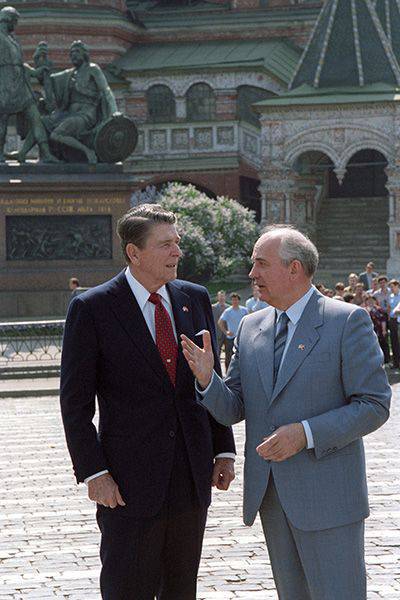
1999 got into a similar situation in June in Spitak and Margaret Thatcher destroyed to the ground, when a crowd of thousands in 2 formed the same more than “close” circle around it. The Prime Minister was practically saved by the head of her guard, attached to the Prime Minister of Great Britain, Mikhail Vladimirovich Titkov. Here you need to understand that Mikhail Vladimirovich at this time was the head of the 1-th department. Realizing the importance of the visit and following the professional traditions of the “nine”, he almost took over the post, although it was in his power to appoint to the post any officer of the 18 division. Realizing what was happening, and imagining what might happen, he almost forcefully put her in a car and a cunning maneuver, promising that they were going to look at the legendary Armenian crosses - “khachkars”, took her ... to the airport. Already on the plane, the “iron lady” literally promised to dismiss Mikhail Vladimirovich, although she didn’t say how and how ... ”
Valery Nikolayevich himself tells about how the operational support of the visit took place:
“We started by saying that before each event with Reagan’s participation, all 6 thousands of accredited correspondents were shuffled randomly to determine which of them would be sitting where. That is, the New York Times was no longer guaranteed that its journalists would sit in the front row, as they were used to, if the lot did not accidentally fall on them. Thus, the repeated presence of the same persons next to Reagan was excluded.
Next was the usual method of testing equipment and people using service dogs, gas analyzers and so on. There was large-scale counterintelligence work in the places of residence of correspondents, each was closely monitored. But the sandwich, as you know, drops butter down. Our terrorist, as it turned out, on the last day in Vnukovo-2 stood a meter and a half from President Reagan. But next to him were the KGB officers, who were focused on neutralizing anyone whose slightest actions could have caused them to be suspicious.
Until now, it is not clear how exactly this man was going to make an attempt. Soon we received operational information that he abandoned his intentions, but gathered at the official event to blow up a pyrotechnic cartridge. Imagine what would happen? And the one and the other guard on a platoon. Someone with a fright could and react, shoot. To provoke shooting with the victims. But we did not allow this. ”
In 2013, Valery Velichko presented to the public his book “From Lubyanka to the Kremlin”, which clearly and in detail tells about the events of this period on behalf of the original source. Valeriy Nikolayevich completes the picture of everything that happened in the “nine” in the period of the State Emergency Committee and after it, with very interesting details.
Flowers and bullets for the president
Just two months after the unpleasant events in Japan, another incident that was quite serious in terms of operational security occurred. This time in Sweden, during the one-day visit of Gorbachev (already the president of the USSR and still the CPSU general secretary) on the occasion of the Nobel Peace Prize. At the end of the performance of Mikhail Sergeyevich a woman came up to the stage with a bouquet of flowers. The presidential guard politely stopped her. Realizing that they would not let her in to the speaker, the woman began to shower him with curses, a male voice supported her from the audience. The man and the woman were detained by the Swedish special services.
This is all information that has become public domain. Behind the scenes of what was happening, a completely different “spectacle” was played out, and it began more than a year before the visit by the efforts of Western special services. With the help of special technologies, the double of one of the employees of the Scandinavian direction of the Ministry of Foreign Affairs of the USSR was selected and properly “processed”.
Only ten years later, Georgiy Georgievich Rogozin explained the essence of the incident (from 1988 to 1992 he worked at the Institute for Security Problems, then became head of the Security Service of the President of the Russian Federation BN Yeltsin). Directly from Moscow, through Major-General Veniamin Vladimirovich Maksenkov’s deputy Yuri Sergeyevich Plekhanov, Georgy Rogozin, by special communications, warned Boris Golentsov, who was attached to Gorbachev, about an actual attempt on the life of the Soviet leader. This was the first time that the N-9 dealt with new psychophysical technologies. Detailed information about this story is in the archives of NAST Russia.
In the USSR, Gorbachev’s communication with the people was also not without incidents. By the beginning of 1990, many people had already become disillusioned with its policy, against the background of shortages and bloody clashes in a number of union republics, discontent was growing. In Kiev, Gorbachev, as usual, unexpectedly for the guard, stopped the car, got out of it, and began to make a traditional speech. Suddenly, from somewhere in the crowd, a case flew in his direction. Field security officer Andrei Belikov intercepted the item and closed the case with his body. Fortunately, it was not explosive: in the case lay another complaint. The leadership of the KGB of the USSR awarded Belikov with a valuable gift.
There were plenty of incidents during the time Mikhail Gorbachev was in power, but a carefully planned real attempt on his life happened on November 7 of the year 1990, during a demonstration on Red Square.
The security plan for ceremonial events on Red Square is a particularly interesting and, perhaps, the oldest complete document from the time of Joseph Stalin. It was also a weighty folder for the 1990 year, considering all additions and clarifications, especially in the alarm action item, totaled more than 150 pages. And on this day it worked like a clock on the Spasskaya Tower.
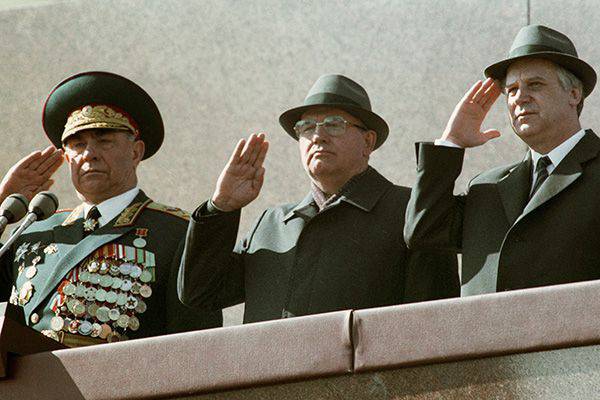
In contrast to the May, the November demonstration of workers began immediately after the military parade. If you look closely at the enthusiastic mass of people passing through Red Square, you can see that they are moving in organized columns. So, these columns were organized by the employees of the N-9 together with the forces attached to it. At the same time, officers and security officers were put forward in advance due to the order along with the demonstrators from the Historical passage, thus asking the direction of their movement. When the head rank of the workers finished their way on Vasilyevsky Spusk, the workers of the “Nine” (strictly in civilian clothes), who accompanied them, stopped at the tribunes of the Mausoleum. And the very corridors that can be seen in the television chronicles of those years were formed.
The security plan provided that when corridors were formed, the central places in them — opposite to Lenin’s Mausoleum — were occupied by officers - employees of the Nine. There were six corridors altogether, and in the near three of them professional security officers had their posts. Infused forces formed a continuation of the corridors.
Senior police sergeant Mylnikov, who was standing in the fourth corridor opposite the Mausoleum, suddenly saw a passing demonstrator pulling a double-edged edge from under his coat and pointing him towards the Mausoleum stands. The policeman responded instantly: he blocked the attacker's hand, grabbed the barrels and jerked them up, and then snatched the weapon. Shots sounded. To help Mylnikov ran up the officers of the "nine" from the nearby corridors. An instant later, the shooter literally “swam” in the hands of the guard towards the central entrance to the GUM. It was there, according to the security plan, that such “characters” should have been evacuated.
A lone terrorist turned out to be a junior research fellow at the Cybernetics Research Institute Alexander Shmonov. During the search, they found a note in which he, in case of his death, informed that he was going to kill the President of the USSR. The results of the attack could have been serious, since the gunman was standing directly in front of the Mausoleum’s rostrum, only 46 meters from her, and the gun was well shot down. From this it was possible to lay moose on the spot with 150 meters. During the interrogation, the terrorist stated that he accuses Gorbachev of seizing power without the consent of the people, as well as of the death of people in Tbilisi on April 9 of 1989 and in Baku on January 20 of January 1990.
This story is somewhat similar to Ilyin's attempt on the life of Brezhnev in 1969. Their motives were about the same. Shmonov, like Ilyin, was mentally ill. In both cases, lone terrorists acted, and both were neutralized thanks to the professionalism of the N-nine employees. This was achieved due to the rigorous implementation by all divisions of the fundamental provisions of the planned training of personnel of the department of service and combat training. Leonid Andreevich Stepin was responsible for this department after the attempt on Brezhnev from August 22 on 1969. 6 November 1942, Leonid Stepin, then a sergeant, repulsed the attack on Anastas Mikoyan’s car when leaving the Spassky Gate of the Kremlin, was seriously wounded in the leg. For this episode, he was awarded the Order of the Red Banner.
There was, however, during the reign of Gorbachev and another incident with an edge, but already, rather, from a series of curiosities. As the head of the 1 division of the 9 division of the KGB of the USSR, Viktor Vasilyevich Aleinikov, recalled, in Krasnoyarsk, during the traditional conversation between the leader and the people, Mikhail Vladimirovich Titkov saw a man in a crowd with a crop under his clothes. He was detained, but it turned out that he was not a terrorist at all, but an ordinary hunter, who, returning from the forest, saw the crowd and decided to see what was happening. After the trial, the man was released, taking a promise from him around the city with a gun no longer pacing.
"Three minutes to pack!"
As it most often happened in Russian history, the greatest danger for the first person comes not from some lonely malefactors, but from his own environment. In August, 1991, during the coup, among the "conspirators" will be Yuri Sergeevich Plekhanov, the head of the 9 Directorate, and his first deputy, Vyacheslav Vladimirovich Generalov. Why are conspirators in quotes? Time put everything in its place. Both generals are rehabilitated.
In the “case of the State Emergency Committee” three years later, Yuriy Sergeevich was amnestied and rehabilitated on the day of his death on July 10 2002 by Russian President Vladimir Putin. All awards and rank were returned to him. But he did not recognize this ...
Someone else, and the leadership of the Nine was much better than the president, informed about the real state of affairs in the country. As noted by Dmitry Fonarev, Gorbachev simply did not want to hear about "negative signals from the field." In the operational certificates of three to four printed pages for members of the Politburo of the CPSU Central Committee, which were prepared in the “nine”, “alarming” news was on the last pages. Some protected people sometimes simply did not have enough time or patience to read them. And the desire to analyze the reality was not enough, too.
Note that even when close to the General Secretary of the Central Committee of the CPSU, the head of the 9 Office remained subordinate to the Chairman of the USSR KGB, Vladimir Aleksandrovich Kryuchkov. Formally, it was Vladimir Kryuchkov who was directly subordinate to Mikhail Gorbachev and had direct access to all members of the Central Committee Politburo and members of the government. It was he, as the head of the state security, who was aware of everything that was happening and, fulfilling his duties, informed the country's leadership in a timely manner. According to Dmitry Fonarev, leaving Gorbachev on vacation at a time when the country was literally boiling over in the cauldron of contradictions was not just carelessness, but already a bureaucratic position.
The State Emergency Committee after all appeared far from scratch. In June, 1991, at the session of the Supreme Soviet of the USSR, Vladimir Aleksandrovich Kryuchkov, who, like Yury Plekhanov, was a pupil and appointee for the post of Chairman of the KGB of the USSR Yuri Andropov, made a speech about “agents of influence” and joined the demand of Prime Minister Valentin Pavlov for the provision of the Cabinet ministers of the USSR "emergency powers". Kryuchkov had operational developments for two members of the Politburo, but when he put these documents on Gorbachev’s desk, he ordered that such work be stopped. He could not believe in the objectivity of the professional work of the security officers. Already at the beginning of 1990's, Vladimir Alexandrovich himself spoke about this episode in a television interview with the program “600 seconds”. Therefore, Valentin Pavlov requested extraordinary powers for the Council of Ministers, since the Minister of Defense of the USSR formally submitted to the Council of Ministers.
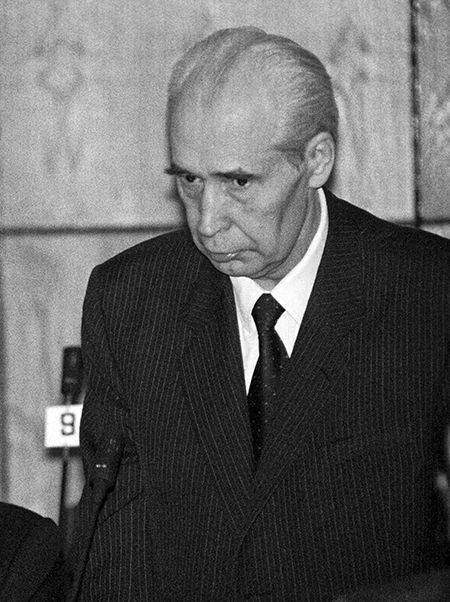
Most likely, Vladimir Kryuchkov had information about the essence of the negotiations of the President of the RSFSR Boris Yeltsin with the leaders of the still-union republics about the "decentralization" of the country. Boris Yeltsin’s ambitions were obvious, and his influence on the situation grew. It was necessary to resist it decisively and very quickly.
On 20 August 1991, Gorbachev was scheduled to sign the Union Treaty. He probably did not think that the heads of the republics would only be happy to subscribe to the idea that would lead to the collapse of the country, and not to its consolidation. After all, for them, the sweet word “independence” meant personal unlimited power. Local kings by a simple stroke of the pen became kings. In just a few months, these aspirations will finally confirm the agreement in Belovezhskaya Pushcha ...
But even before that, the goals of local elites were well understood by sensible people in the leadership of the USSR. A vivid example was the process of gaining independence by the Baltic republics. So, 11 March 1990 of the year proclaims independence of Lithuania, 4 of May is a declaration on the restoration of independence adopted by Latvia, 8 of May the Estonian SSR is renamed the Republic of Estonia. 12 January 1991, Yeltsin signs the Treaty on the Basics of Interstate Relations of the RSFSR and the Republic of Estonia in Tallinn. At the time of the coup, the USSR has not yet recognized the independence of the Baltic republics, it will happen a little later, but the collapse of the state has already begun.
In order to counteract the “decentralization”, those sane people from the highest echelons of power created the form of the State Emergency Committee, equipping the delegation to the head of state who was enjoying the rest. Both the chairman of the KGB and the leadership of the 9 Directorate joined the people who did not want the Union to collapse. Being not just patriots, but professional state security officers who swore an oath to their homeland, they could not afford to let the country derail. Well, Gorbachev, according to our expert Dmitry Fonarev, when he realized what was happening, he simply “went into himself” and waited, “where everything will turn out.”
However, how many people, so many opinions. Everyone who took part both in the "Foros seat" and in the "Foros trip" has its own point of view regarding the events of that time. At the same time, there are details that are not archived, but are transmitted only in words and only to those whom the narrator-eyewitness trusts. The full picture can be restored only by a detailed study of all versions. The Gorbachev field guard, at his direction, voiced his version of events at the site of the 9-th Directorate of the KGB of the USSR “Zarya” on his instructions to television journalists.
So, on August 19, the president was going to fly to Moscow, since the signing of the Union Treaty was scheduled for 20. According to Medvedev, under Gorbachev it was instituted that when he returned from somewhere to the capital, someone from the leaders of the Moscow Nine would fly behind him.
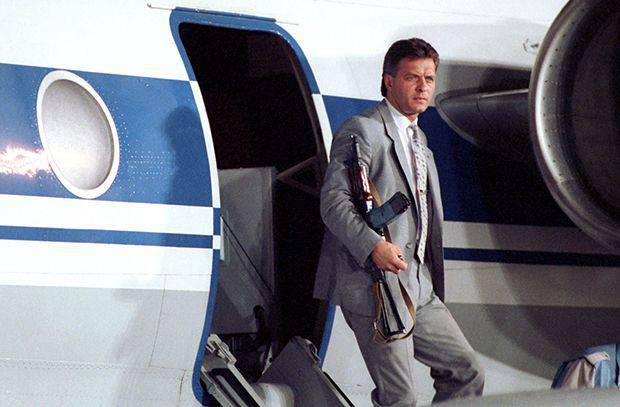
And now 18 August in Foros arrived Yury Sergeevich Plekhanov and his deputy Vyacheslav Vladimirovich Generalov. Only this time, not alone: a whole delegation flew to Gorbachev. These were people from the inner circle of the president: Oleg Shenin, head of the department of organizational work, Oleg Baklanov, secretary of the CPSU Central Committee, Valery Boldin, head of the presidential administration, Lieutenant General Valentin Varennikov, deputy defense minister of the USSR. They conferred with Gorbachev, then Yuri Plekhanov informed Vladimir Medvedev that the president would continue his rest in Foros, and ordered Medvedev himself to fly to Moscow. Here's how this episode is described in the book “The Man Behind His Back”:
“Now I was talking about elementary military discipline.
- That's an order? - I asked.
- Yes! - answered Plekhanov.
- Are you removing me? For what?
- Everything is done as agreed.
- Give the written order, otherwise I will not fly. The matter is serious, you will refuse tomorrow, and how will I look?
Plekhanov took a piece of paper, a pen, and sat down to write. ”
Medvedev was given "three minutes to pack."
He further writes: “My bosses understood well that it was impossible to leave me at the dacha, I would never agree with them, continue to serve the president faithfully, as it always has been.”
So, the head of the “nine” spoke out practically against the state-protected person, and the head of the security guard attached to Gorbachev, who could take the situation under control and arrange for the president to be sent to Moscow, was instantly removed from business.
Security "triangle"
Such a view may seem out of the ordinary to outsiders. But for those who are related to personal protection, the situation is quite understandable, if not to say standard.
Any leader of the country is taken under the protection of the state and at the expense of the state. By decision of the leadership of the state guard, persons responsible for ensuring personal security are appointed to positions. Heads of departments designate executors of security plans - attached and so on according to the structural hierarchy. At the same time, the guiding principle of direct submission is maintained.
But historically, all the chiefs of protection (senior officers attached) of the leaders of our country, whatever it was called, always performed the work assigned to them by the state in the interests of the protected person. This is the psychology of professionals, who every minute are responsible for everything that happens to the person who entrusted them with their safety. And it will always be like this; it is simply impossible to work in a different way in the attached position. The only question remains is the situation when the actions of the protected person will clearly and unequivocally threaten the security of the country.
But the leaders of the state security system, if they are professional, will always work exclusively for the state, which has given them confidence (just like that, with a capital letter), having been appointed to such an important position.
This is the eternal contradiction between the relations in the triangle protected person - the head of the system - attached.
Mikhail Sergeyevich with Raisa Maksimovna did not penetrate into these psychological subtleties. Probably, they perceived their security group as an armed universal service at public expense. Understanding why they need this protection, they did not bother to delimit the sphere of private and state interests.
Therefore, it is quite natural that, not finding the head of his own guard, Vladimir Medvedev, at his usual home in the main house of Zarya, Gorbachev immediately considered him a “traitor” and did not even let me in his car upon arrival. Major-General Medvedev, Major Valery Pestov, became Deputy Chief of Security of Gorbachev, and Oleg Klimov became his first deputy.
“The head of state who has broken away from the real world did not even think that his attached one was not and never was his property,” notes Dmitry Fonarev. “A flawlessly professional personal security officer, Vladimir Medvedev, is in fact much better than the Gorbachev couples, taken together, understood the Kremlin (and not only) life. And he did what the officer of the KGB of the USSR did, and not the servant of the noble ruler. ”
No security system - no state
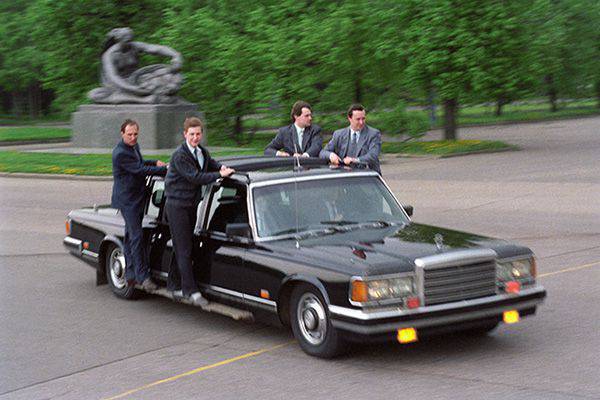
It can be said that by the end of August 1991, the fate of the “nine”, and indeed the entire KGB, was almost resolved. Moreover, the “State Emergency Committee case” was not the main reason here, but rather, only the last link in the whole chain of processes that took place in those years in the highest echelons of Soviet politics.
29 May 1990 Boris Yeltsin was elected Chairman of the Supreme Council of the RSFSR and occupied an office in the White House on the banks of the Moscow River. His activity was aimed at isolating the powers of the RSFSR within the USSR, which is vividly confirmed by the “Declaration of State Sovereignty of the RSFSR” adopted by Yeltsin already on June 12 of June NNUMX. This document sharply increased the influence of Boris Nikolayevich on the political Olympus of the USSR. But the events of the August putsch further strengthened his role.
Therefore, immediately upon returning from Foros to the Kremlin, Mikhail Gorbachev was thinking about reforming the personal protection system. According to his plan, the new structure was to enter the office of the President of the USSR. And inside it there should have been two departments responsible for the security of the key statesmen at the time - the President of the USSR Gorbachev and the Chairman of the RSFSR Supreme Council Yeltsin.
And now 31 August 1991, 9-e Management was renamed the Security Department under the apparatus of the President of the USSR and, according to the name, is personally subordinate to Gorbachev. From 31 August to 14 December 1991, the head of this department was 54-year-old Colonel Vladimir Stepanovich Redkobory, previously mentioned in the publications of this series, and his first deputies were the head of personal security of the President of the USSR RSFSR Alexander Korzhakov.
Then began the infamous "reform" of the KGB. After the arrest of members of the Emergency Committee of the events unfolded rapidly. Boris Yeltsin, who felt his power, imposed his own person on Gorbachev to the post of KGB chairman as the USSR, and on August 23 Vadim Bakatin headed state security. In his memoirs, Boris Yeltsin did not conceal that "... this man had to destroy this terrible system of suppression, which had been preserved since Stalin's times." What Vadim Viktorovich successfully implemented.
Subsequently, he wrote about the seven principles of “reforming” the KGB, the main of which were “disintegration” and “decentralization”. And as the last "principle" was meant "undiminished security of the country." Obviously, all the “Yeltsin-Bakatin” principles regarding the state security system were mutually exclusive. Professional security officers know that when reforming any system operational unit for the period of a new formation, its effectiveness decreases by a third. Well, when there is no security system, there is no state. What convincingly and showed further events ...
3 December 1991, Gorbachev abolishes the KGB of the USSR. The powers of the state security keep the republican security committees. 8 December after the signing of 11 by the heads of the Union republics of the Bialowieza Agreement, the Soviet Union ceased to exist, and December 25 Mikhail Gorbachev resigned from the presidency.
We will talk about how the protection of the country's top officials was organized in the Yeltsin era in the next publication of this series.
Information